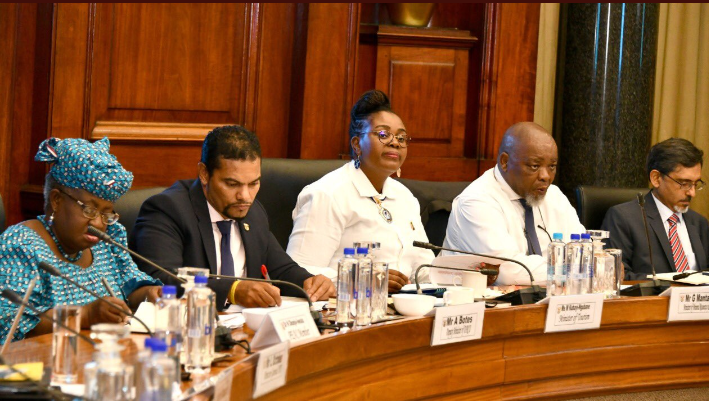Ololade Adeyanju/
Renowned economist and former Nigerian minister of finance, Dr. Ngozi Okonjo-Iweala, has been appointed member of the South African Presidential Economic Advisory Council.
Okonjo-Iweala who is the newest member of the council attended its second meeting held at the Union Buildings, in Tshwane, Pretoria, South Africa, on Friday.
The former World Bank Managing Director yesterday tweeted a photo of herself and her colleagues at the meeting.
The meeting was chaired by President Cyril Ramaphosa who doubles as chairman of the council.
According to a post shared on Twitter by the South African presidency via @PresidencyZA, the meeting “focused on global trends and South Africa’s re-industrialisation programme”.
“It further reflected on the state’s role in driving mission-oriented, challenge-led projects, including advancing a new energy paradigm for the country,” it added.

The advisory council comprises of local and international economic thought leaders bringing together prominent economists and technical experts drawn from academia, private sector, labour, community, think tanks and other constituencies.
The council advises the Ramaphosa and the South African government in facilitating the development and implementation of economic policies that spur inclusive growth, and serves as a forum for in-depth discussions on emerging global and domestic developments, economic and development policies.
While announcing the setting up of the council in a statement in October, last year, Ramaphosa’s spokesperson, Khusela Diko, had listed its key responsibilities as follow:
“The Council is a non-statutory and independent body chaired by the President and brings together prominent economists and technical experts drawn from academia, the private sector, labour, community, think tanks and other constituencies. The members, who will volunteer their time and be compensated for subsistence and travel, are appointed to serve a three-year term.
“The Council constitutes expertise in international economics; macroeconomics (including fiscal policy and monetary economics); labour economics; economics of education and the economics of poverty and inequality and urban development. Other areas of insights entail microeconomics with a focus on network industries, regulation and competition, trade, energy and climate change.
“It is expected that the Council will serve as a forum for in-depth and structured discussions on emerging global and domestic developments, economic and development policies, and to facilitate socialisation and diligent execution thereof.
“It will be supported by a Secretariat drawn from National Treasury and Policy and Research Services in the Presidency that will, inter alia, feed enhanced economic research into deliberations of the Council. The Council is further expected to establish clear protocols for engaging with other critical structures such as the National Economic Development and Labour Council (NEDLAC).”
The Council will meet quarterly at first and will in due course decide on timelines that will best enable deliberations among Council members and the Council’s interface with the President.
This operating model is intended to enhance the work being undertaken to build a capable state, as demanded by the National Development Plan. The Council will also be instrumental in building a knowledge base of policy and implementation lessons, best practices and field-tested success stories.
0





